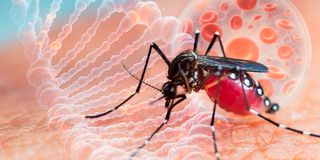Mosquito-borne diseases could be curbed with toxic males, Study finds

Insect pests are a major threat to global health and agriculture. PHOTO| POOL
What you need to know:
- Insect pests are a major threat to global health and agriculture, causing hundreds of thousands of deaths and millions of infections each year
- Researchers at the ARC Centre of Excellence in Synthetic Biology at Macquarie University in Australia have developed a new approach called the Toxic Male Technique (TMT), which involves genetically engineering male insects to produce toxic proteins in their sperm
A new genetic biocontrol method that shortens the lifespan of female insects could be as effective as pesticides in reducing populations of disease-spreading mosquitoes and harmful crop pests, researchers say.
Insect pests are a major threat to global health and agriculture, causing hundreds of thousands of deaths and millions of infections each year, and costing billions in healthcare and crop damage. As a result, the biocontrol is increasingly seen as a promising alternative to traditional pesticides, which can harm non-target species and ecosystems, while becoming less effective due to growing resistance.
Researchers at the ARC Centre of Excellence in Synthetic Biology at Macquarie University in Australia have developed a new approach called the Toxic Male Technique (TMT), which involves genetically engineering male insects to produce toxic proteins in their sperm.
When these males mate with females, the proteins significantly reduce the lifespan of the females, potentially leading to rapid control of pest populations and combating mosquito-borne diseases such as malaria, dengue and Zika.
The findings published in Nature Communications notes that TMT is more efficient than existing methods, such as the Sterile Insect Technique, which involves releasing large numbers of sterilised or genetically modified males to mate with wild females. With these existing methods, mated females may produce no offspring or only male offspring, but they continue to feed and spread disease until they die naturally. In contrast, TMT drastically shortens the lifespan of the females, resulting in a faster reduction in pest populations and disease transmission.
The technique works by genetically modifying male insects to produce venom proteins that are transferred to females during mating. These proteins significantly shorten the lifespan of the females and reduce their ability to transmit disease. In their experiments, the researchers found that mating with genetically modified males reduced the lifespan of females by 60 percent.
While the researchers are aiming for a 100 percent reduction in lifespan - meaning the females would die immediately after mating. The scientists suggest that even a 60 percent reduction could significantly reduce the spread of mosquito-borne diseases. For mosquitoes such as Aedes aegypti and Anopheles gambiae, which spread diseases such as malaria, dengue and Zika, a 60 percent to 80 percent reduction in lifespan can prevent the female from transmitting the virus within the critical post-infection period.
By rapidly reducing pest populations and disease transmission, TMT could provide a more sustainable and effective alternative to traditional pesticides, offering hope for both public health and agriculture.
"We believe our technology has the potential to work as quickly as pesticides, but without the environmental risks and harm to other species. The TMT method is also more cost-effective. You need fewer males to achieve a much faster reduction in insect populations or the spread of disease,” said Samuel Beach, lead author of the study.



